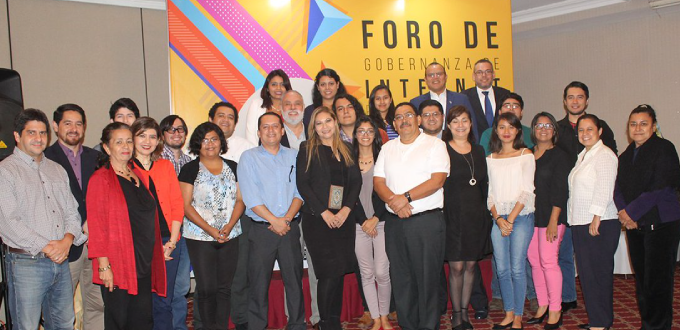Internet Governance: A Voice for Everyone
31/10/2018

This past month, LACNIC’s Líderes program has supported several national Internet Governance spaces in countries of the LAC region, always seeking to promote the presence of multiple voices in these debates. Members of the LACNIC staff participated actively in the meetings held in El Salvador, Costa Rica, Haiti and Venezuela.
LACNIC tries to bring its multistakeholder vision to these spaces to enrich participant’s learning of Internet Governance
First IGF in El Salvador. LACNIC R+D Engineer Alejandro Acosta participated in the first IGF to be held in El Salvador, along with other national and foreign presenters. Close to 100 attendees were divided into seven discussion groups and addressed topics such as infrastructure, security, economy and legal issues. Participants were able to hear voices representing academia, civil society, NGOs and technical experts, moderated mainly by Rafael Lito Ibarra, a member of the LACNIC and ICANN boards.
Discussions followed the analytical model which groups Internet governance issues into seven categories or “baskets,” and the inputs achieved were included in a final document with the reports of each group.
Acosta also presented at the Internet Governance Forum in Venezuela, where the topics discussed were very similar to those addressed in El Salvador.
Three major topics in Costa Rica. César Díaz, Head of Strategic Relations and Telecommunications at LACNIC, was present for the second Costa Rican Dialogue on Internet Governance, where participants discussed three main topics: cybersecurity, net neutrality and Internet access.
These discussions took place in round table format, encouraging the participation all attendees. LACNIC’s representative participated in the round table on Internet Access, where he presented the organization’s point of view as well as positive experiences in ensuring access for the citizens of the region.
After the sessions, each rapporteur presented a report on what their group had discussed.
Haiti’s disconnected population. Kevon Swift, Head of Strategic Relations and Integration at LACNIC, brought the voice of the organization to the first IGF Haiti, where the main focus was on “Connecting the unconnected and building the digital future in Haiti.” This forum revolved around connectivity and Internet access in the country with a focus on combating digital exclusion.
During the event, participants discussed digital inclusion with a multistakeholder approach, promoting initiatives aimed at developing infrastructure and reducing inequalities in connectivity and access to the Internet. Initiatives such as Ayitic Goes Global seek to improve access to employment for women in Haiti through the development of digital capabilities.
All stakeholders agreed that connectivity and Internet access should be implemented to combat digital exclusion and reduce inequalities in connectivity and Internet access in Haiti. “This is a privileged space for the Haitian community, as the Forum addresses digital development,” noted Swift. According to data provided by event attendees, only 15% of the Haitian population has access to the Internet.
(Free access, no subscription required)